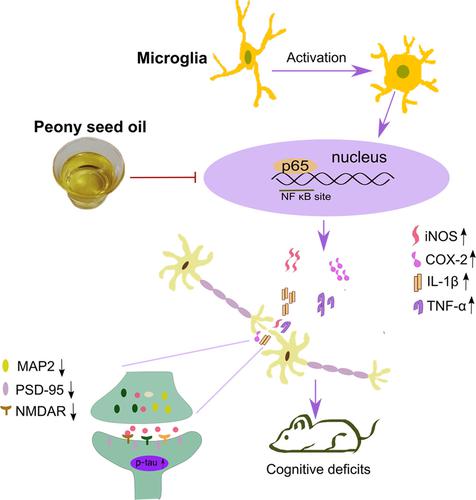当前位置:
X-MOL 学术
›
J. Leukoc. Biol.
›
论文详情
Our official English website, www.x-mol.net, welcomes your feedback! (Note: you will need to create a separate account there.)
Peony seed oil ameliorates neuroinflammation-mediated cognitive deficits by suppressing microglial activation through inhibition of NF-κB pathway in presenilin 1/2 conditional double knockout mice
Journal of Leukocyte Biology ( IF 5.5 ) Pub Date : 2021-09-08 , DOI: 10.1002/jlb.3ma0821-639rr Jie Gao 1, 2, 3 , Lijun Wang 1, 2 , Chenyi Zhao 1 , Yongkang Wu 1 , Zhiyuan Lu 1 , Yining Gu 2 , Zongtao Ba 2 , Xingyu Wang 1 , Jian Wang 2 , Ying Xu 1
Journal of Leukocyte Biology ( IF 5.5 ) Pub Date : 2021-09-08 , DOI: 10.1002/jlb.3ma0821-639rr Jie Gao 1, 2, 3 , Lijun Wang 1, 2 , Chenyi Zhao 1 , Yongkang Wu 1 , Zhiyuan Lu 1 , Yining Gu 2 , Zongtao Ba 2 , Xingyu Wang 1 , Jian Wang 2 , Ying Xu 1
Affiliation

|
Chronic neuroinflammation has been shown to exert adverse influences on the pathology of Alzheimer's disease (AD), associated with the release of abundant proinflammatory mediators by excessively activated microglia, causing synaptic dysfunction, neuronal degeneration, and memory deficits. Thus, the prevention of microglial activation-associated neuroinflammation is important target for deterring neurodegenerative disorders. Peony seed oil (PSO) is a new food resource, rich in α-linolenic acid, the precursor of long chain omega-3 polyunsaturated fatty acids, including docosahexaenoic acid and eicosapentaenoic acid, which exhibit anti-inflammatory properties by altering cell membrane phospholipid fatty acid compositions, disrupting lipid rafts, and inhibiting the activation of the proinflammatory transcription factor NF-κB. However, few studies have examined the anti-neuroinflammatory effects of PSO in AD, and the relevant molecular mechanisms remain unclear. Presenilin1/2 conditional double knockout (PS cDKO) mice display obvious AD-like phenotypes, such as neuroinflammatory responses, synaptic dysfunction, and cognitive deficits. Here, we assessed the potential neuroprotective effects of PSO against neuroinflammation-mediated cognitive deficits in PS cDKO using behavioral tests and molecular biologic analyses. Our study demonstrated that PSO suppressed microglial activation and neuroinflammation through the down-regulation of proinflammatory mediators, such as inducible NOS, COX-2, IL-1β, and TNF-α, in the prefrontal cortex and hippocampus of PS cDKO mice. Further, PSO significantly lessened memory impairment by reversing hyperphosphorylated tau and synaptic proteins deficits in PS cDKO mice. Importantly, PSO's therapeutic effects on cognitive deficits were due to inhibiting neuroinflammatory responses mediated by NF-κB signaling pathway. Taken together, PSO may represent an effective dietary supplementation to restrain the neurodegenerative processes of AD.
中文翻译:

牡丹籽油通过抑制早老素 1/2 条件双基因敲除小鼠的 NF-κB 通路抑制小胶质细胞激活,从而改善神经炎症介导的认知缺陷
慢性神经炎症已被证明对阿尔茨海默病 (AD) 的病理学产生不利影响,与过度激活的小胶质细胞释放大量促炎介质有关,导致突触功能障碍、神经元变性和记忆障碍。因此,预防小胶质细胞激活相关的神经炎症是阻止神经退行性疾病的重要目标。牡丹籽油 (PSO) 是一种新的食物资源,富含 α-亚麻酸,这是长链 omega-3 多不饱和脂肪酸的前体,包括二十二碳六烯酸和二十碳五烯酸,通过改变细胞膜磷脂脂肪表现出抗炎特性。酸成分,破坏脂筏,并抑制促炎转录因子 NF-κB 的激活。然而,很少有研究探讨 PSO 在 AD 中的抗神经炎症作用,相关分子机制尚不清楚。Presenilin1/2 条件性双敲除 (PS cDKO) 小鼠表现出明显的 AD 样表型,例如神经炎症反应、突触功能障碍和认知缺陷。在这里,我们使用行为测试和分子生物学分析评估了 PSO 对 PS cDKO 中神经炎症介导的认知缺陷的潜在神经保护作用。我们的研究表明,PSO 通过下调 PS cDKO 小鼠的前额叶皮层和海马中的促炎介质(如诱导型 NOS、COX-2、IL-1β 和 TNF-α)来抑制小胶质细胞激活和神经炎症。更远,PSO 通过逆转 PS cDKO 小鼠的过度磷酸化 tau 和突触蛋白缺陷,显着减轻了记忆障碍。重要的是,PSO 对认知缺陷的治疗作用是由于抑制了由 NF-κB 信号通路介导的神经炎症反应。总之,PSO 可能是一种有效的膳食补充剂,可以抑制 AD 的神经退行性过程。
更新日期:2021-09-08
中文翻译:

牡丹籽油通过抑制早老素 1/2 条件双基因敲除小鼠的 NF-κB 通路抑制小胶质细胞激活,从而改善神经炎症介导的认知缺陷
慢性神经炎症已被证明对阿尔茨海默病 (AD) 的病理学产生不利影响,与过度激活的小胶质细胞释放大量促炎介质有关,导致突触功能障碍、神经元变性和记忆障碍。因此,预防小胶质细胞激活相关的神经炎症是阻止神经退行性疾病的重要目标。牡丹籽油 (PSO) 是一种新的食物资源,富含 α-亚麻酸,这是长链 omega-3 多不饱和脂肪酸的前体,包括二十二碳六烯酸和二十碳五烯酸,通过改变细胞膜磷脂脂肪表现出抗炎特性。酸成分,破坏脂筏,并抑制促炎转录因子 NF-κB 的激活。然而,很少有研究探讨 PSO 在 AD 中的抗神经炎症作用,相关分子机制尚不清楚。Presenilin1/2 条件性双敲除 (PS cDKO) 小鼠表现出明显的 AD 样表型,例如神经炎症反应、突触功能障碍和认知缺陷。在这里,我们使用行为测试和分子生物学分析评估了 PSO 对 PS cDKO 中神经炎症介导的认知缺陷的潜在神经保护作用。我们的研究表明,PSO 通过下调 PS cDKO 小鼠的前额叶皮层和海马中的促炎介质(如诱导型 NOS、COX-2、IL-1β 和 TNF-α)来抑制小胶质细胞激活和神经炎症。更远,PSO 通过逆转 PS cDKO 小鼠的过度磷酸化 tau 和突触蛋白缺陷,显着减轻了记忆障碍。重要的是,PSO 对认知缺陷的治疗作用是由于抑制了由 NF-κB 信号通路介导的神经炎症反应。总之,PSO 可能是一种有效的膳食补充剂,可以抑制 AD 的神经退行性过程。



























 京公网安备 11010802027423号
京公网安备 11010802027423号